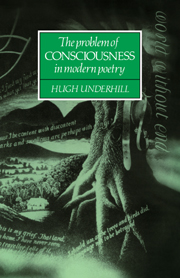Book contents
- Frontmatter
- Contents
- Preface
- Introduction: the inward revolution
- 1 From Georgian origins to ‘Romantic primitivism’: D. H. Lawrence and Robert Graves
- 2 Strangers to nature: modern nature poetry and the rural myth
- 3 The ‘poetical character’ of Edward Thomas
- 4 ‘Myself must I remake’: W. B. Yeats
- 5 ‘Here and now cease to matter’: T. S. Eliot
- 6 The work of Man: Louis MacNeice and W. H. Auden
- 7 ‘Nothing of our light’: Ted Hughes
- Conclusion
- Notes
- Select bibliography
- Index
Conclusion
Published online by Cambridge University Press: 18 December 2009
- Frontmatter
- Contents
- Preface
- Introduction: the inward revolution
- 1 From Georgian origins to ‘Romantic primitivism’: D. H. Lawrence and Robert Graves
- 2 Strangers to nature: modern nature poetry and the rural myth
- 3 The ‘poetical character’ of Edward Thomas
- 4 ‘Myself must I remake’: W. B. Yeats
- 5 ‘Here and now cease to matter’: T. S. Eliot
- 6 The work of Man: Louis MacNeice and W. H. Auden
- 7 ‘Nothing of our light’: Ted Hughes
- Conclusion
- Notes
- Select bibliography
- Index
Summary
What has been widely experienced as a crisis of consciousness has produced a preoccupation in modern poetry with subjective life, partly because any problem of consciousness is of necessity in the subjective realm, and partly because the crisis itself has seemed to these poets the result of a breakdown in the institutions of the outer world. To be conscious means to be conscious of self, and of separation from the other, but the self-consciousness of consciousness in the modern period, the acuteness of consciousness in the poet, threaten to overwhelm him, appear at times barely tolerable. This subjective focus tends to underrepresent the extent to which the alienated state of consciousness, the ‘ontological insecurity’, is socio-historically determined. The problem is signalled by various kinds of contradiction in the poetry: between world and otherworld, ‘nature’ and ‘eternity’, poet as ‘maker’ and as ‘oracle’, between the presumption in subjects that they are free, autonomous and coherent and the feeling that they are not, between longing for social relatedness and an intensity of self-realization. To an extent, the assigning of inward and ‘spiritual’, emotional and sensory concerns to poetry takes place as some felt consensual need to correct imbalances in a culture which seems ever more intent on defining itself against positivist and materialist criteria.
- Type
- Chapter
- Information
- The Problem of Consciousness in Modern Poetry , pp. 300 - 309Publisher: Cambridge University PressPrint publication year: 1992



